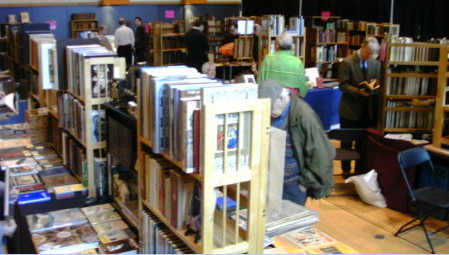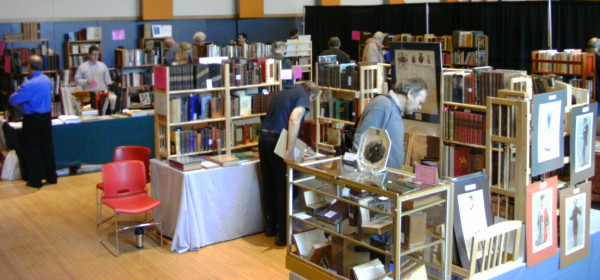Home | Conditions of sale, and orders
![]()
Home | Conditions of
sale, and orders
![]()
Return to main Special Features page | Return to Book Fairs 101 Intro page

As dealers, we're all in this together! |
I now turn to a topic that I have a lot of trouble with, and often have to be nudged into remembering: the neighbours. It's always smart to cultivate your neighbours, whether at home or at a fair. This starts with introductions and chatting, but it also includes keeping them in mind while setting up your booth or during the fair opening hours. During the course of the day or weekend you end up spending time talking with them, watching their booths as they escape for a few minutes and, on occasion, referring customers to one another. So what are the book fair "fences" that make you a good neighbour? |
Are their books similar to mine?
If so, what do I do?
Most fairs are laid out either on a first come/first choice or a lottery basis. It is, therefore, likely that, at some time or other, you may be placed next to someone with very similar taste in books. This can be handled in several ways, the easiest is to isolate your booth from theirs by arranging your book cases to block the line-of-sight through to the competing stock. This does, though, serve to close in their booth, perhaps more than they would like. In which case, take a look at their stock and familiarize yourself with where their books differ from yours. The occasional, "No, ma'am, I haven't got what your looking for, but my neighbour may," goes a long way towards smoothing over rough edges.
You may also simply choose, if only part of the merchandise is similar, to put the competing items as far away from that neighbour's booth as you can. This way your stock and his/hers are not taken in by the customer in a single glance, but seen as two separate collections. If you both think that way, so much the better.
I have also seen a few colleagues with stocks that are similar and complimentary, but not really overlapping, to combine their booths into one large shared space. But this requires both parties to be very familiar with each other's stock and comfortable cross-selling. Do this only with good friends, and with details on how to handle things agreed to well in advance, because a missed opportunity for your booth mate can make for an uncomfortable day/weekend.
Can I take advantage of their set-up to make mine better?
Yes, but only with permission.
Very often, the owner of a neighbouring booth arranges his equipment in a way that I can use to my advantage: a bookcase or display screen that backs onto my booth can be both used and disguised by my hanging prints, documents or pamphlets from it; or a bit of unused table behind a bookcase can support the third leg of a tripod stand. The little advantage offered can sometimes add a great deal to the look of my booth but, for the sake of good relations, I always ask permission. It is usually granted, and the gesture is always appreciated.
On the rare occasion that my request has been refused, it has usually been for a reason that I couldn't have know about. In one case, it involved a peg board that had a wonky leg, and competing weight on the back would have destabilized it - at the same time, the colleague who'd set up the pegboard had forgotten her hangers, and I fortunately had a set that I rarely use, but always carry!
Does the back of my booth show through to theirs?
Then I should make sure that my space doesn't detract from theirs.
Several years ago, at the Boston ABAA fair, I hung a matted item on a pole between two bookcases. It had been a harried set up as the organizers had been very late in delivering tables to my booth - sin of sins! As a result, I was careless, and had not taken the effect of the relatively ugly backside of the matte and taped-up mounting of the pole on his line of sight into account. Fortunately, I'd known my neighbour for some time and, an hour or so before opening, he'd gently chided me for adversely affecting his booth. Though I could not substantially alter my display at such a late hour, I was able to stretch a colourful drape across the entire space. It not only hid the unattractive parts of my set-up, but also provided him with a good backdrop for part of his display. An easy fix, a happy neighbour, and a lesson well learned!
Does their set-up detract from mine?
I can, and do, rearrange my layout to take this into account.
I recently did a fair where the neighbour that backed up on me had a number of large framed items she wanted to arrange along her back table, hoping to lean them on the rear of my bookcases - with permission, of course. But that left my customers staring at the backs of her 19th century, unrestored frames. So, though I had originally planned to have an open center area, and with the prospect of my customers looking at the backs of her paintings, I decided to tighten up the display and move the open spaces to the corners. The result being that, with a minor re-setting, I had a happy neighbour (she could show her paintings to their best advantage), and my customers were not even aware of her booth or its contents.

Can I crib off their power hook up?
If they've paid for it, probably not, but if your need is minimal they might offer.
If you wanted to run, say, one light off an extension cord that's near your booth and has an open socket, you can try approaching the neighbour whose power connection it is. I've done that when I wanted to plug in my electric cooler on the last day of a show, and have offered to help pay for the connection but have never been asked to. If you want to do more, go to the organizers and pay for your own hook-up.
On the other hand, if you see your neighbour has a small need and you have an extra socket, why not be magnanimous?
What if their set-up adversely affects mine?
See if you can come up with a creative solution that benefits both of you.
Sometimes others can be thoughtless in arranging their booths (see "Your back ..." above), often because of factors beyond their control. A case in point was a fair in a hotel ballroom with less than adequate lighting and a comparatively low ceiling. A neighbour had a phalanx of book boxes he planned to erect on my side of his booth, along our common wall, and a table with bookcases on the far side. The boxes, being solid, would effectively block most of the light I was going to get from the chandelier over his booth, leaving me with a rather gloomy space, and only one clip-on light to illuminate it (I have since found some wonderful tiny, but powerful, LED lamps). If he switched his bookcases and boxes around I would have more - if still somewhat inadequate - light. Before he got too far into his set-up, I approached him with my problem and was able to provide that simple solution, even offering to help make the change. If you examine the situation carefully, there is usually a way to solve a problem without setting off alarms.
Two dealers in one space ... the closest of neighbours!
Many fairs offer half booths, which you may be able to opt to share with a particular colleague or you could just be assigned a booth mate. In the former case, you know what you're getting into, in the latter it's a gamble.

|
If you have the luxury of choosing your booth-mate, choose someone you know, like and have little overlap with, but whose stock somewhat complements yours. Over the years we've opted to share with two British dealers, one who specialized in manuscripts, the other in early literature. Although neither of them carried items that competed directly with our largely-British late 19th and early 20th century stock, they did dovetail nicely. Knowing them in advance allowed us to discuss our equipment needs and how to balance spaces — we've been known to trade 1' of space along the rear wall, so our colleague could have a 6' trophy case, for a shared entry space at the front and our 5' counter case across the our side of the opening. We also were happy to supply him with any small items he may have forgotten bring (scisors, tape and the like), as well as having a bag of sweets tucked away to keep us all going. If your booth-mate is assigned, take a few minutes to greet each other and talk about how you want to deal with the shared space. Think about whether your set-up interferes with the other space at all and, if his/hers impinges on you, how you can solve it amicably. It it doesn't hurt to get to know a little about his/her stock, either; you may be able to lead customers to something they'd be interested in, but be sure s/he's comfortable with that. |
Good "fences" do make good neighbours!
Return to main Special Features page | Return to Book Fairs 101 Intro page
Home | Conditions of sale, and orders
Last updated: 04/02/2017
Site maintained by Susan Ravdin